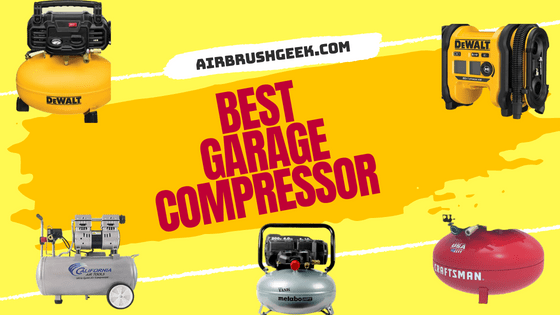Best Garage Compressor

In this roundup post, I will be sharing with you the 5 best garage compressor on the market today. These garage compressors are designed to optimize performance, improve efficiency, and simplify maintenance for your compressor system. Whether you’re an avid DIYer or a professional mechanic, these products are must-haves to take your garage workspace to the next level.
Dewalt 20V MAX Tire Inflator
$119.60 in stock
6 used from $113.23
The DEWALT 20V MAX Tire Inflator is a versatile and compact tool that operates on 20V MAX battery, 12V DC, or 110V AC for maximum convenience. With a digital gauge for easy pressure setting and automatic shut-off feature, inflating anything from tires to mattresses is a breeze. The high-pressure rubber hose ensures durability, while the LED light provides illumination in dark spaces. Reviews praise its power, portability, and efficient inflation process, making it an ideal choice for both home and on-the-go use.
CAT 8010 Air Compressor, Ultra Quiet
$210.00 in stock
The California Air Tools 8010 Steel Tank Air Compressor is a top choice for those seeking a quiet and reliable air compressor. With a noise level of only 60 decibels, this compressor is perfect for indoor use where noise is a concern. It boasts a powerful 1.0 HP motor and an oil-free dual piston pump system, ensuring high performance and durability. The 8-gallon steel tank is lightweight and easily transportable with the included wheel kit. Customers praise its quiet operation and overall performance, making it a valuable investment for various pneumatic tools and tasks.
Craftsman 6 Gallon Pancake Air Compressor
$169.99 in stock
The Craftsman Air Compressor, 6 Gallon, Pancake design, Oil-Free, comes with a 13 Piece Accessory Kit. Proudly made in the USA with global materials in Jackson, Tennessee, this portable compressor is durable and maintenance-free thanks to its oil-free pump. Users find it great for various tasks like filling up tires, boost leak checks, and cleaning due to its user-friendly features like two attachment ports and easy-to-read gauges. It does its job impeccably, though it can be a bit loud and has a safety release valve that some find uncomfortable to pull. Overall, it’s an excellent choice for those seeking a reliable air compressor with all necessary accessories included.
DEWALT Pancake Air Compressor
$159.00 in stock
14 used from $123.00
The DEWALT Pancake Air Compressor, 6 Gallon, 165 PSI (DWFP55126) is a versatile tool with a 6.0-gallon tank and a high-efficiency motor for quick tool run time and recovery. Users appreciate its compact size and quick pressure buildup, making it perfect for craft rooms or quiet job sites. This compressor delivers reliable performance and ease of use, making it a solid choice for various applications.
Metabo HPT EC914S Air Compressor
$199.00 in stock
6 used from $191.04
The Metabo HPT Air Compressor, also known as THE TANK™, boasts a powerful 200 PSI which is 25% higher than a standard pancake compressor, providing increased efficiency. With 4 CFM @ 90 PSI for 30% more air flow, it can easily support multiple large body nailers simultaneously. Users have noted its sturdy build and fast recovery rate, making it a reliable workhorse for various tasks, despite being on the louder side. Its versatility allows for smooth operation with framing nailers or other roofing equipment.
Factors to Consider When Choosing a Garage Compressor
- **Size and Portability**: Evaluate the physical size of the compressor to ensure it fits in your garage space and is easy to move around if needed. Consider whether you need a portable unit or a stationary one based on your usage requirements
- **CFM Rating**: Check the cubic feet per minute (CFM) rating of the compressor to determine if it can meet your air tool’s requirements. Make sure the CFM output aligns with the tools you plan to use, as insufficient airflow can affect performance
- **Tank Capacity**: The tank capacity impacts how long the compressor can run before needing to refill. Consider the size of projects you’ll be working on to determine the appropriate tank size. A larger tank capacity is ideal for continuous use with pneumatic tools
How to choose the best garage compressor
Price Range forthe best Garage Compressors
- Entry-level garage compressors typically range from $100 to $300. These models are suitable for light-duty tasks like inflating tires and powering air tools intermittently
- Mid-range garage compressors can cost between $300 and $600. These compressors offer more power and capacity, making them suitable for regular use in DIY projects and small workshops
- Premium garage compressors are priced above $600. These high-end models come with advanced features such as high CFM, larger tank size, and longer duty cycles, making them ideal for professional use or heavy-duty tasks in a commercial setting
Using Your Garage Compressor Efficiently
- Start by reading the user manual for the garage compressor to familiarize yourself with its functions and safety instructions
- Connect the compressor to a power source and ensure it is placed on a stable surface
- Adjust the pressure settings according to the requirements of the task, then attach the appropriate air hose to the compressor and the tool you will be using
FAQs about the Best Garage Compressor
When purchasing a garage compressor, there are several key features to consider:
- **CFM (Cubic Feet per Minute)**: This indicates the airflow output of the compressor, which is important for powering pneumatic tools in your garage.
- **Tank Size**: The tank size determines how much compressed air can be stored. A larger tank size can provide longer run times between refills.
- **Horsepower**: The horsepower of the motor affects the compressor’s performance. Higher horsepower can provide more power for heavy-duty tasks.
- **Portability**: Consider the weight and size of the compressor if you need to move it around in your garage often.
- **Oil-Free vs. Oil-Lubricated**: Oil-free compressors require less maintenance but may not be as durable as oil-lubricated ones. Choose based on your preference.
- **Noise Level**: Some compressors can be quite loud, so consider the noise level if you’re working in an enclosed garage.
- **Brand and Warranty**: Opt for a reputable brand that offers a warranty on their product for added peace of mind.
Portable compressors can be suitable for garage use, depending on the specific needs of the user. Portable compressors are convenient for small garage spaces or for moving around to different areas. However, they may have limited capacity and may not be ideal for heavy-duty or continuous use. It is essential to check the specifications of the portable compressor to ensure it meets the requirements of the tasks you intend to carry out in your garage.
Oil-free compressors can be a good choice for garage use, especially if you are concerned about potential oil contamination in your workspace or in the air supply. They require less maintenance since you don’t have to worry about changing and disposing of oil. However, oil-free compressors may have a shorter lifespan compared to oil-lubricated models, and they may not be as suitable for heavy-duty applications. It’s important to consider your specific needs and usage requirements when deciding if an oil-free compressor is better for your garage.
Yes, a garage compressor can typically be used to inflate car tires. These compressors are designed to inflate various types of tires, including those on cars. However, it is important to check the compressor’s specifications to ensure it has the appropriate air pressure range and nozzle size for your car tires. You should also monitor the tire pressure while inflating to prevent overinflating.
Yes, there are specific installation requirements for a garage compressor. In general, it is important to ensure that the compressor is placed on a stable, flat surface that can support its weight. It should also be placed in a well-ventilated area to prevent overheating. Additionally, you will need to have access to a power outlet that can handle the electrical requirements of the compressor. Finally, it is recommended to follow the manufacturer’s instructions for installation to ensure safe and efficient operation.
Even the best garage compressor need to be maintain properly.To maintain a garage compressor for optimal performance, it is essential to follow these steps:
- Regularly check and change the air filter to ensure the compressor works efficiently.
- Keep the compressor clean by wiping down surfaces and removing dust and debris.
- Inspect hoses and connections for leaks, and replace any damaged parts promptly.
- Drain moisture from the tank regularly to prevent corrosion.
- Lubricate moving parts according to the manufacturer’s recommendations.
- Monitor the compressor’s pressure levels and adjust as needed.
- Store the compressor in a clean and dry area when not in use to prevent damage.
Again, even the best garage compressor can have issues. To troubleshoot common issues with a garage compressor, start by checking the power source to ensure it is plugged in and turned on. Next, inspect the air hose for any leaks or blockages. Make sure the compressor tank has enough air pressure by checking the pressure gauge. Another important step is to examine the compressor’s air filter and replace it if necessary. Additionally, listen for any unusual noises coming from the compressor which could indicate a problem with the motor or other components. Finally, if these steps do not resolve the issue, consult the owner’s manual for further troubleshooting tips or contact a professional for assistance.
Yes, a garage compressor can be used for painting automotive parts. However, it is important to ensure that the compressor has the necessary capacity and features to handle painting tasks effectively. You may need an LVLP spray gun with a small compressor to spay your car at home. It is also crucial to properly prepare the area for painting and use appropriate safety equipment.
To calculate the minimum airflow required for your garage tools, you will need to consider the total CFM (cubic feet per minute) required by all the tools in use simultaneously. You can find the CFM requirements for each tool in the manufacturer’s specifications or by using a CFM meter. Once you have the individual CFM values, add them together to determine the total CFM needed. This total CFM value will help you select the appropriate size of an air compressor or ventilation system for your garage tools.
What safety precautions should I take when operating a garage compressor?
When operating a garage compressor, there are several safety precautions you should take to ensure your safety:
- Read the manufacturer’s instructions: Start by carefully reading the user manual provided by the compressor manufacturer. Understanding how to operate the compressor safely is crucial.
- Personal protective equipment (PPE): Always wear appropriate PPE such as safety goggles, gloves, and ear protection to protect yourself from any potential hazards.
- Proper ventilation: Make sure you operate the compressor in a well-ventilated area to avoid inhaling harmful fumes that may be produced.
- Regular maintenance: Keep the compressor well-maintained by regularly checking for leaks, ensuring proper lubrication, and any other recommended maintenance procedures.
- Secure the compressor: Make sure the compressor is placed on a stable surface and securely grounded to prevent any tipping or electrical hazards.
- Follow operational guidelines: Operate the compressor according to the manufacturer’s recommendations, including proper start-up and shut-down procedures.


















I found the tips on maintenance and safety precautions to be very helpful. Thanks for sharing!
This article provided a great list of essential products for a garage compressor setup, very informative!